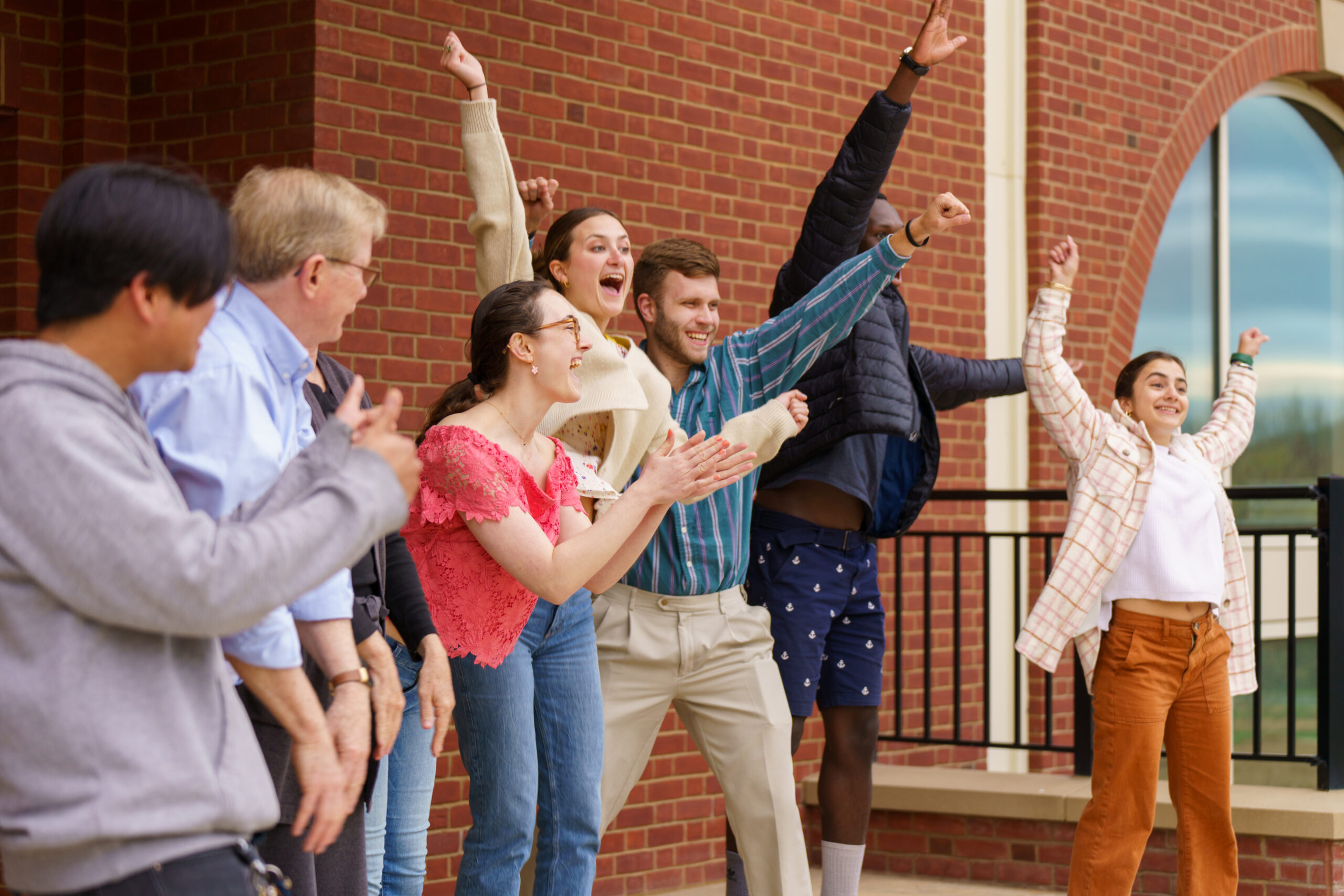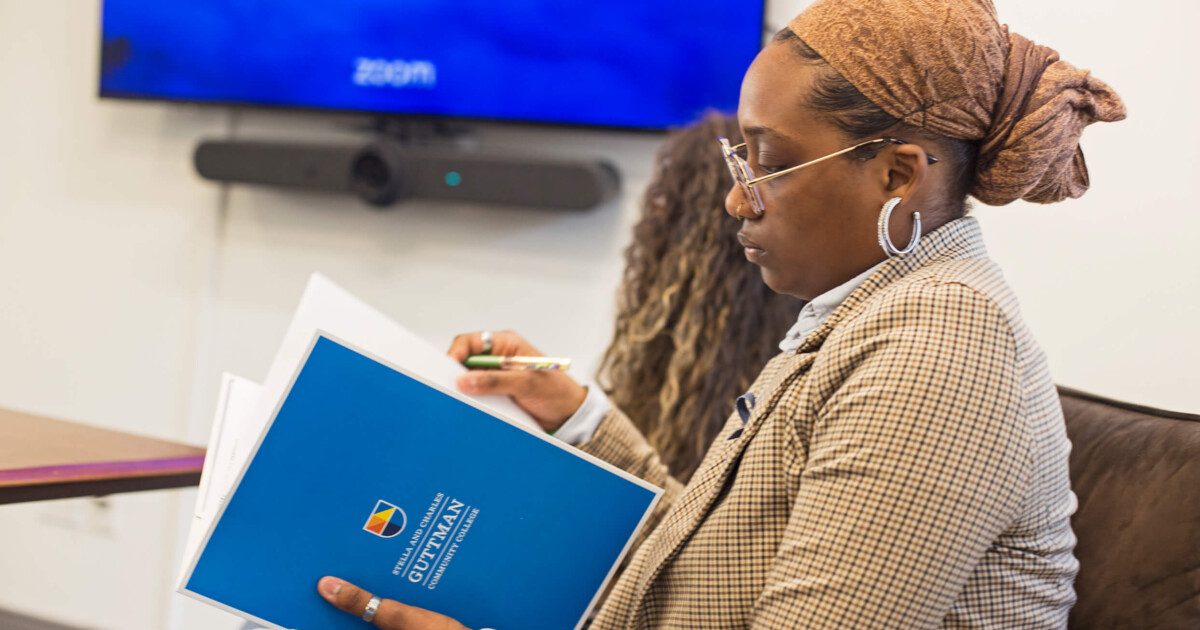
The Bucknell University seniors trod onto the grassy quad outside the Breakiron Engineering Building. Their professor, Joseph Tranquillo, explained the rules of the game, which were straightforward, though not necessarily intuitive: Make a human chain with your teammates without touching them. The students eyed each other nervously, waiting for someone else to kick things off.
One walked out and turned to face the others, striking a pose before them. Then another moved to his side, making a shape with her body that linked with his. The rest of the class followed suit, sticking hands under bent elbows and air-hugging arms around ankles. Eventually their tangle of shapes came together to form a sculpture of limbs and torsos.
Professor Tranquillo then asked them to complete the task more quickly, requiring a higher level of teamwork and a lower threshold for awkwardness. They met the challenge and got into a rhythm that taught them instinctively what Tranquillo was hoping to impart: When entering an existing situation, always look for the open opportunity. On a new team or organization, consider: “What can I learn here and how can I leave my own mark behind?”
This exercise was part of “Bucknell-on-Purpose,” a Senior Dinner Seminar Tranquillo, associate provost for Transformative Teaching and Learning, co-teaches with Keith Buffinton, dean emeritus of Engineering at Bucknell. Part of the university’s Residential College Program, Bucknell’s Senior Dinner Seminars bring together an intimate group, in this case 17, once a week for an hour-and-a-half. Over two semesters, the students build trust and connection with each other and their instructors, while eating and exploring their course topic of choice.

In Tranquillo and Buffinton’s class, this topic—“purpose”—required students to reflect on their college experiences and, as those came to an end, their futures beyond just post-graduate jobs or degrees. Even Tranquillo’s warm-up exercises, like the game of allegorical Twister, emphasized collaboration and letting go of self-consciousness, but also prompted them to consider how they envision contributing to the wider world.
“We spend a lot of time preparing students academically for their professional lives after graduation but less so on their human development—their values and sense of purpose and how those align with what they decide to do,” said Keith Buffinton. “We chose to offer this seminar so seniors will ask themselves these important questions before they leave here.”
An emphasis on discovering purpose has become more prevalent in educational and professional spheres as a way to combat personal and professional discontent and increase engagement. Another driving force is its effect on wellbeing for an emerging generation experiencing widespread mental health issues. A 2019 report, “Forging Pathways to Purposeful Work: The Role of Higher Education,” produced by Gallup and Bates College, showed 80% of college graduates believed having purpose in their work was important, but less than 50% had actually found it. Graduates who reported having high purpose in their work were nearly ten times more likely than their low purpose peers to have high overall wellbeing.
“We spend a lot of time preparing students academically for their professional lives after graduation but less so on their human development—their values and sense of purpose and how those align with what they decide to do.”
The object of Tranquillo and Buffinton’s course was not necessarily to help students decide what career path would be most satisfying but to help them conceive of a more general blueprint by which to live their lives. Stanford University engineering professors Bill Burnett and Dave Evans popularized this work—taking an intentional approach to plotting the future—with their course, “Designing Your Life: How to Build a Well-Lived, Joyful Life.” In “Bucknell-on-Purpose,” students read excerpts and participated in activities from the Palo Alto team’s book by the same name.

“We looked, in particular, at balancing ‘Workview’ and ‘Lifeview’ and asked the students to complete worksheets from the book to better understand and to reconcile their ‘philosophy of work’ and their ‘philosophy of life,’” Buffinton wrote in his report on the class for Bucknell President John Bravman.
Coursework for the Bucknell seminar ventured beyond the “Designing Your Life” curriculum. In the first session, the seniors determined three major themes to guide the class: Discovering the Purpose Within, Exploring Purpose in Others, and Finding Purpose in Community. To explore these areas, they engaged in activities, including using body outlines and post-it notes to map their “external self” (how the outside world views them from surface-level interactions) compared to their “internal self” (more hidden thoughts or elements of who they are); and research and interviews to develop insight into and empathy for the unique experiences and senses of purpose of others. Guest speakers included Rev. Kurt Nelson, director of Religious and Spiritual Life at Bucknell, who talked about finding purpose through communal connection; and President Bravman, who participated in the external/internal mapping exercise.
“Engaging students in any way that’s not their typical structure is difficult,” Tranquillo said of the course’s variable structure and emphasis on self-exploration. The instructors said they enjoyed allowing students to dictate the material, moving away from putting restrictions on what or how they choose to learn. Students also encountered a space, rare in most classrooms, to focus on better understanding themselves, rather than scholarly concepts. “We have faculty willing to go there [help students through questions of self or identity], but that’s not the point of their courses,” Tranquillo added. He and Buffinton hope similar, less traditionally “academic” forums will become available for not only seniors but all classes in the future.
As for teaching “purpose,” those interested in expanding the work may need to clarify what it entails for not only faculty but students. Some seniors in “Bucknell-on-Purpose” admitted to enrolling for the free dinner or because they already knew a friend or professor involved. “I had zero expectations. Someone I respected told me about it, so I took it,” one student revealed. He ended up getting more than he bargained for. “It surpassed my expectations because I thought I would just kind of learn facts, and it’s actually made me think about the world in a different way.”
The experiential nature of the course helps with understanding and internalizing purpose. One guest speaker asked the seniors, “When you were a child, what did you want to be when you grew up?” One student grew up an aspiring car salesman, with a sister who planned to open a bakery attached to his dealership, but is now pursuing computer engineering to pay off tuition debt. Another was an animal lover whose veterinary dreams ended when she realized she wasn’t interested in dealing with blood but evolved into her current plans to build prosthetics for humans. One young man, David, talked about how his experience as an immigrant from Soweto, South Africa influenced his identity, how he thinks of himself, and what he hopes to do.
“I migrated to the inner cities of the U.S., and the question I always asked myself, growing up in Crenshaw, Los Angeles, was, ‘What would an average Black man who lived in the inner city, what could they see themselves becoming?’” David shared. He described feeling like his parents’ perspective as immigrants prompted him to envision a future outside the neighborhood where he grew up. Their encouragement continues to shape his plans for the future. “I think some form of the idea of stability has always been important to me—the idea of, ‘How do I make sure that if anything were to happen, my family comes first?’”
One of the ways in which the course changed students’ outlooks involved reframing the pressures they’ve internalized around professional success. “I feel like if you don’t have a job post-grad right now, it’s seen as a failure on your part,” Maya, who was also in the seminar, said. “This class really framed it more as a reflection of maybe that you don’t know what you want to do—and that’s okay. It’s okay to be kind of floundering or looking for new opportunities.”

“I think in our society, we correlate purpose with career a lot, and this class has opened up my perspective to show it’s more about the relationships that you make,” Emma, another student, added. “You can make relationships through your career, but other things outside of your career can also relate to purpose.”
While the prospect of graduating remains daunting, this course gave students tools to combat the uncertainty, even after they leave. “It has made me realize that I need to make space for these conversations in the future, regardless of where I am,” Maya said. She envisions herself carving out room for similar discussions when she matriculates to graduate school in the fall.
“I don’t think it needs to be this exact same structure of a class, but I think the idea of ‘Let’s think about things critically when we think about our future and our purpose’ is something I will be able to recreate, and want to, after this course.”
The post Bucknell on Purpose appeared first on LearningWell Magazine.





